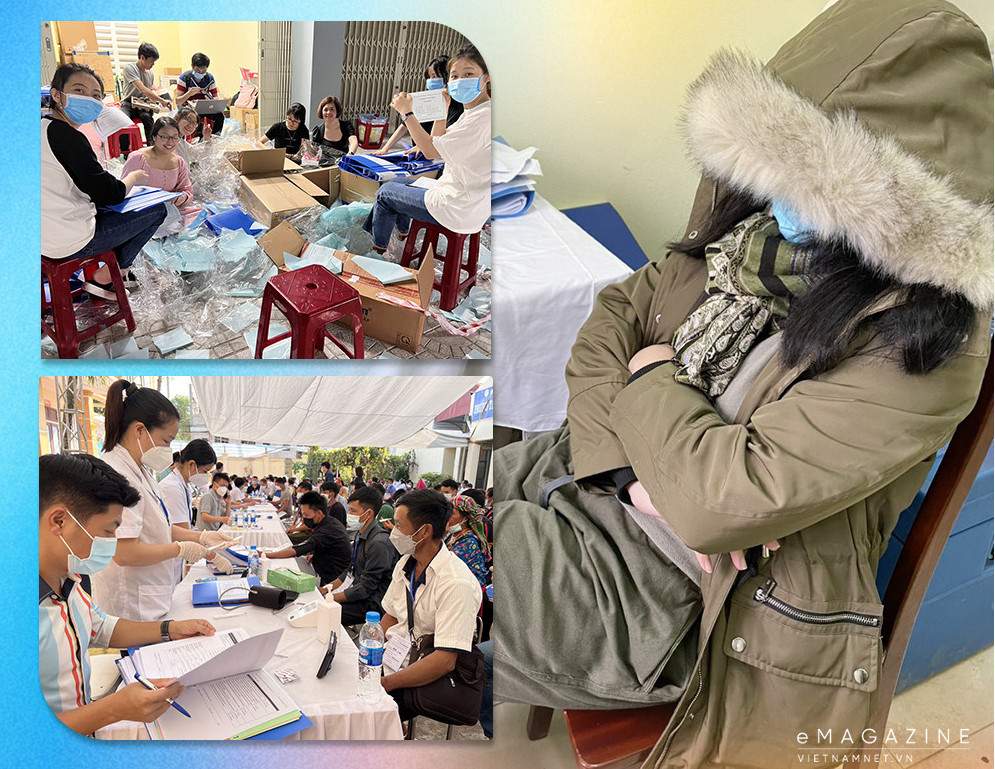
In mid-March 2021, when ‘Covid vaccine’ was a keyword on newspapers, forums and social networks, a group of six female researchers from the Center for Clinical Pharmacology under the Hanoi Medical University was assigned an important task – implementing the first human trial injections of Covivac, the first Covid vaccine of Vietnam, developed by Nha Trang Vaccine and Medical Biologicals Company.
On March 15, standing in the medicine preparation room, pharmacists Bui Thi Huong Thao and Nguyen Thi Thuy, who have many years of experience, were seen trembling when their every movement was constantly observed by supervisory experts.
Outside the room, there were many officials from ministries and reporters, waiting to rush in to catch the first information about the vaccine testing. A senior nurse assigned to vaccinate volunteers could not help but quiver at that breathless moment.
On that morning, the whole team only had one task – preparing medicine and injecting six volunteers. Of these, only one person was injected with real vaccine, while the other fives got a placebo.
At the same time several months later, the research team and their co-workers gave injections to hundreds of volunteers.
Prior to that, to select 120 volunteers for the trials in Phase 1, the 6-member research team led by Associate Prof Doctor Pham Thi Van Anh underwent hard working days.
“Just 2-3 days after the information on seeking volunteers for vaccine trial injections was published on websites and fanpages, the research team received 3,000 registrations. After that, we selected the candidates and contacted 250 individuals,” Anh recalled.
“Finally, 224 volunteers came to have a medical examination to prepare for the trials, and 120 were chosen as they could meet the requirements,” she said.
After the first phase of Covivac, in August 2021, the center was once again trusted to be chosen as the unit implementing all 3 phases in the ARCT-154 vaccine clinical trial.
When Phase 1 finished, Hanoi began the vaccination campaign for all people. Therefore, it was necessary to seek volunteers. Yen Phong district in Bac Ninh province and Quang Xuong in Thanh Hoa were chosen as the next research points.
Just within two months, the research team and the professional units of the Hanoi Medicine University gave medical examinations and screening to 7,895 candidates and selected 5,919 volunteers meeting the requirements to join the research.
The whole ARCT-154 vaccine research process was implemented within 13 months amid the complicated developments of the pandemic.
Several months after the trial of ARCT-154, in December 2021, the center was once again assigned to conduct Phase 3 clinical trials of Shionogi vaccine.
Within four months, the female researchers selected and screened 6,849 volunteers and gave injections to 5,240 individuals at 10 different research points in seven provinces.
According to Thao, it was the time when the pandemic broke out in the north, and the team had to conduct three research works at the same time.
“We were working without seeing the sun. Sometimes we had to run against the clock because people had to use up all the government’s vaccines the next day. If people were injected with licensed vaccines, they did not get trial injections,” Thao explained.
“There were days when we left home at 5 am and finished our work at midnight,” Thao said.
Dang Thi Ngoc Mai, the youngest member of the research team, joked that during that days, she had to ‘run with 300 percent capacity’.
“I got home at 2 am. The same thing was repeated every day from August 2021 to March 2022,” Mai said.
In addition to research, the center was assigned to verify vaccines before licensing. Sometimes the officers of the center had to work one or two days just before Tet, because they had to run against the time to prevent epidemics.
In 2022, they took 60 business trips to cities and provinces. During the Covid-19 period, they joined forces with colleagues to seek, screen and give medical examinations to 13,000 volunteers. Thanks to the examinations, many people got appropriate treatment.
Nguyen Thao